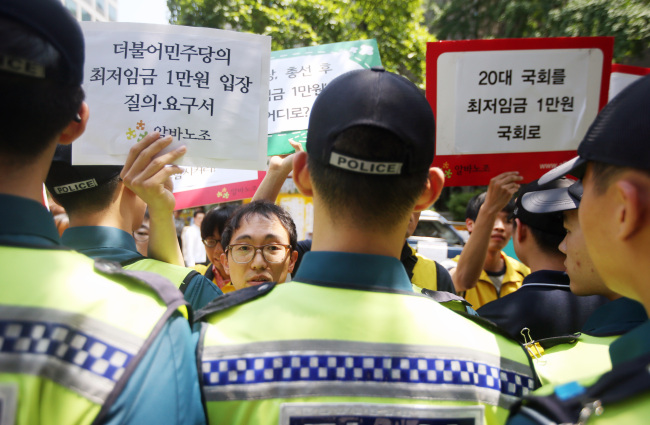[From the scene] Part-timers fast in fight for minimum wage hike
By Ock Hyun-juPublished : June 22, 2016 - 17:11
On Tuesday afternoon, some 15 part-timers were sitting shoulder-to-shoulder on the pavement behind a poster reading “Fight for 10,000 won minimum wage” at the entrance of the National Assembly in western Seoul.
Among the 20-something workers chattering and giggling were members of the nation’s Part-Time Workers’ Union who have been on a hunger strike since June 16 to demand next year’s minimum wage be raised to 10,000 won ($8.67). This year’s minimum wage per hour stands at 6,030 won, up 8.1 percent from last year.
“It’s bearable to refuse meals. For part-timers, starving is just an ordinary routine,” Park Jung-hoon, president of Part-Time Workers’ Union, told The Korea Herald. “Ironically, I am not eating to protect my rights to eat.”
“We are not here to demand a lot of money. We are here to demand the government guarantee workers the very least standard of living as a human being,” the man said slowly and quietly, wearing a hat to avoid the blazing sun.
Among the 20-something workers chattering and giggling were members of the nation’s Part-Time Workers’ Union who have been on a hunger strike since June 16 to demand next year’s minimum wage be raised to 10,000 won ($8.67). This year’s minimum wage per hour stands at 6,030 won, up 8.1 percent from last year.
“It’s bearable to refuse meals. For part-timers, starving is just an ordinary routine,” Park Jung-hoon, president of Part-Time Workers’ Union, told The Korea Herald. “Ironically, I am not eating to protect my rights to eat.”
“We are not here to demand a lot of money. We are here to demand the government guarantee workers the very least standard of living as a human being,” the man said slowly and quietly, wearing a hat to avoid the blazing sun.

Park and four other union members chose to fast in protest against what they see as the flawed system that sets the minimum wage in favor of employers and lawmakers’ inaction to fulfil their election pledges to increase the wage.
The hunger strike comes amid a fierce clash over the extent of the minimum wage hike between laborers and employers. Four rounds of negotiations on next year’s rate have been held since April, with a plenary session scheduled on Thursday.
Labor unions argue that the hike would curb the nation’s income inequality, improve living conditions for low-income workers and revitalize the faltering domestic economy by boosting consumer spending.
Business representatives, on the other hand, campaign for a freeze, citing soaring labor costs. They argue that the drastic hike could take a toll on small and medium-sized businesses that are already suffering from the economic downturn and will in return lead to loss of low-skilled jobs.
According to the Korea Employers Federation, 87.6 percent of the laborers receiving the minimum wage are employed by small and medium-sized enterprises. The minimum wage has increased by 7.1 percent on average since 2013.
They also call for adoption of a differentiated minimum wage by industrial sectors, regions, intensity of jobs and types of employment.
Camping outside the parliament building, Park pointed out that the minimum wage of 10,000 won is not achievable under the current system of settling the rate, as it is heavily influenced by the government.
“In order to reflect laborers’ demands in the process and increase the wage, it takes political will. It should be decided at the National Assembly that represents people, not through the Minimum Wage Council,” Park said.
During April’s parliamentary election, the ruling Saenuri Party said it would push for a hike to between 8,000 won and 9,000 won by 2020 when the parliamentary term expires, while the opposition bloc including the main opposition Minjoo Party of Korea vowed to raise the wage to 10,000 won by 2020.
The nation’s minimum wage has been decided through the Minimum Wage Council since 1988. The council consists of 27 delegates – nine each from labor, management and public sector. As employers and employees wrangle over the minimum wage every year, the decision is usually left in the hands of the nine government-appointed delegates from the public sector.
“I worked part-time at a clothing store for six hours daily after school to earn only 600,000 won. There was no money left after I spent it on food and public transport,” said Lee Ga-hyeon, a 24-year-old student, sitting under a black umbrella to keep the sun out.
Since she graduated from high school, she has done seven other part-time jobs including waiting tables and selling merchandise.
“With the way it is right now, I will never be able to improve my life. We are forced to hold several jobs because the hourly minimum wage is too low. We then are not able to focus on our studies.”
Lee said that she felt the irony when selling jewelry that she would never be able to afford, adding that she also felt helpless devastation.
“At first I was just thankful that I could have a job and didn’t know what to do when I received less than the minimum wage. ... I realized that I would never be able to live a better life unless the system changes.”
Police attempted to take those on hunger strike to the police station every day for questioning on charges of holding an illegal assembly since they began the sit-in.
Opposition lawmakers have shown interest in their protest, including Rep. Park Ju-min of The Minjoo Party, Lee Jeong-mi of the Justice Party as well as Goo Gyo-hyeon, the head of the Labor Party, who visited them in a show of support, the organization said.
Other part-timers also joined the protest from a distance by refusing to eat for eight hours to amass a collective 10,000 hours of fasting. As of Wednesday, more than 130 people were involved in fasting some 5, 000 hours collectively.
Despite the heavy rainfall expected in the coming days of the monsoon period, the protestors looked determined to continue the hunger strike. “We will hold a hunger strike despite the rain until the minimum wage is settled,” the union head Park said.
The council needs to submit the agreed minimum wage to the labor minister by June 28. The rate will be declared on Aug. 5 according to the minimum wage act.
By Ock Hyun-ju(laeticia.ock@heraldcorp.com)
The hunger strike comes amid a fierce clash over the extent of the minimum wage hike between laborers and employers. Four rounds of negotiations on next year’s rate have been held since April, with a plenary session scheduled on Thursday.
Labor unions argue that the hike would curb the nation’s income inequality, improve living conditions for low-income workers and revitalize the faltering domestic economy by boosting consumer spending.
Business representatives, on the other hand, campaign for a freeze, citing soaring labor costs. They argue that the drastic hike could take a toll on small and medium-sized businesses that are already suffering from the economic downturn and will in return lead to loss of low-skilled jobs.
According to the Korea Employers Federation, 87.6 percent of the laborers receiving the minimum wage are employed by small and medium-sized enterprises. The minimum wage has increased by 7.1 percent on average since 2013.
They also call for adoption of a differentiated minimum wage by industrial sectors, regions, intensity of jobs and types of employment.
Camping outside the parliament building, Park pointed out that the minimum wage of 10,000 won is not achievable under the current system of settling the rate, as it is heavily influenced by the government.
“In order to reflect laborers’ demands in the process and increase the wage, it takes political will. It should be decided at the National Assembly that represents people, not through the Minimum Wage Council,” Park said.
During April’s parliamentary election, the ruling Saenuri Party said it would push for a hike to between 8,000 won and 9,000 won by 2020 when the parliamentary term expires, while the opposition bloc including the main opposition Minjoo Party of Korea vowed to raise the wage to 10,000 won by 2020.
The nation’s minimum wage has been decided through the Minimum Wage Council since 1988. The council consists of 27 delegates – nine each from labor, management and public sector. As employers and employees wrangle over the minimum wage every year, the decision is usually left in the hands of the nine government-appointed delegates from the public sector.
“I worked part-time at a clothing store for six hours daily after school to earn only 600,000 won. There was no money left after I spent it on food and public transport,” said Lee Ga-hyeon, a 24-year-old student, sitting under a black umbrella to keep the sun out.
Since she graduated from high school, she has done seven other part-time jobs including waiting tables and selling merchandise.
“With the way it is right now, I will never be able to improve my life. We are forced to hold several jobs because the hourly minimum wage is too low. We then are not able to focus on our studies.”
Lee said that she felt the irony when selling jewelry that she would never be able to afford, adding that she also felt helpless devastation.
“At first I was just thankful that I could have a job and didn’t know what to do when I received less than the minimum wage. ... I realized that I would never be able to live a better life unless the system changes.”
Police attempted to take those on hunger strike to the police station every day for questioning on charges of holding an illegal assembly since they began the sit-in.
Opposition lawmakers have shown interest in their protest, including Rep. Park Ju-min of The Minjoo Party, Lee Jeong-mi of the Justice Party as well as Goo Gyo-hyeon, the head of the Labor Party, who visited them in a show of support, the organization said.
Other part-timers also joined the protest from a distance by refusing to eat for eight hours to amass a collective 10,000 hours of fasting. As of Wednesday, more than 130 people were involved in fasting some 5, 000 hours collectively.
Despite the heavy rainfall expected in the coming days of the monsoon period, the protestors looked determined to continue the hunger strike. “We will hold a hunger strike despite the rain until the minimum wage is settled,” the union head Park said.
The council needs to submit the agreed minimum wage to the labor minister by June 28. The rate will be declared on Aug. 5 according to the minimum wage act.
By Ock Hyun-ju(laeticia.ock@heraldcorp.com)
-
Articles by Ock Hyun-ju







![[AtoZ Korean Mind] Does your job define who you are? Should it?](http://res.heraldm.com/phpwas/restmb_idxmake.php?idx=644&simg=/content/image/2024/05/06/20240506050099_0.jpg&u=)











